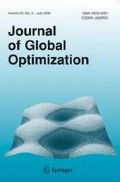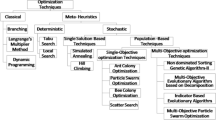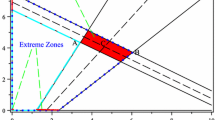Abstract
Classic bilevel programming deals with two level hierarchical optimization problems in which the leader attempts to optimize his/her objective, subject to a set of constraints and his/her follower’s solution. In modelling a real-world bilevel decision problem, some uncertain coefficients often appear in the objective functions and/or constraints of the leader and/or the follower. Also, the leader and the follower may have multiple conflicting objectives that should be optimized simultaneously. Furthermore, multiple followers may be involved in a decision problem and work cooperatively according to each of the possible decisions made by the leader, but with different objectives and/or constraints. Following our previous work, this study proposes a set of models to describe such fuzzy multi-objective, multi-follower (cooperative) bilevel programming problems. We then develop an approximation Kth-best algorithm to solve the problems.
Similar content being viewed by others
References
Anandalingam G., Friesz T.: Hierarchical optimization: an introduction. Ann. Oper. Res. 34, 1–11 (1992). doi:10.1007/BF02098169
Bard J.: Practical Bilevel Optimization: Algorithms and Applications. Kluwer, Amsterdam (1998)
Bialas W., Karwan M.: Twolevel linear programming. Manage. Sci. 30, 1004–1020 (1984)
Bracken J., McGill J.: Mathematical programs with optimization problems in the constraints. Oper. Res. 21, 37–44 (1973)
Candler W., Townsley R.: A linear twolevel programming problem. Comput. Oper. Res. 9, 59–76 (1982). doi:10.1016/0305-0548(82)90006-5
Dempe S.: A simple algorithm for the linear bilevel programming problem. Optimization 18, 373–385 (1987). doi:10.1080/02331938708843247
Hansen P., Jaumard B., Savard G.: New branchandbound rules for linear bilevel programming. SIAM J. Sci. Stat. Comput. 13, 1194–1217 (1992). doi:10.1137/0913069
Lu J., Shi C., Zhang G.: On bilevel multi-follower decision-making: general framework and solutions. Inf. Sci. 176, 1607–1627 (2006). doi:10.1016/j.ins.2005.04.010
Lu J., Shi C., Zhang G.: An extended branch-and-bound algorithm for bilevel multi-follower decision making in a referential-uncooperative situation. Int. J. Inf. Technol. Decis. Mak. 6, 1–18 (2007)
Lu J., Zhang G., Dillon T.: Fuzzy multi-objective bilevel decision making by an approximation Kth-best approach. J. Multi-Valued Logic Soft Comput. 14(3–5), 205–232 (2008)
Lu J., Zhang G., Ruan D., Wu F.: Multi-Objective Group Decision Making: Methods, Software and Applications with Fuzzy Set Technology. Imperial College Press, London (2007)
Miller T., Friesz T., Tobin R.: Heuristic algorithms for delivered price spatially competitive network facility location problems. Ann. Oper. Res. 34, 177–202 (1992). doi:10.1007/BF02098179
Sakawa M.: Fussy Sets and Interactive Multi-Objective Optimization. Plenum, New York (1993)
Sakawa M., Nishizaki I., Uemura Y.: Interactive fuzzy programming for multilevel linear programming problems with fuzzy parameters. Fuzzy Sets Syst. 109, 3–19 (2000). doi:10.1016/S0165-0114(98)00130-4
Von Stackelberg H.: The theory of the market economy. Oxford University Press, New York (1952)
White D., Anandalingam G.: A penalty function approach for solving bi-level linear programs. J. Glob. Optim. 3, 397–419 (1993). doi:10.1007/BF01096412
Zadeh L.A.: Fuzzy Sets. Inf. Contr. 8, 338–353 (1965). doi:10.1016/S0019-9958(65)90241-X
Zhang G., Lu J.: The definition of optimal solution and an extended Kuhn-Tucker approach for fuzzy linear bilevel programming. IEEE Comput. Intell. Bull. 5, 1–7 (2005)
Zhang G., Lu J.: Model and approach of fuzzy bilevel decision making for logistics planning problem. J. Enterprise Inf. Manage 20, 178–197 (2007). doi:10.1108/17410390710725760
Zhang G., Lu J., Dillon T.: A branch-and-bound algorithm for fuzzy bilevel decision making. In: Ruan D. (eds) Applied Artificial Intelligence, pp. 291–298. World Scientific, Singapore (2006)
Zhang G., Lu J., Dillon T.: Decentralized multi-objective bilevel decision making with fuzzy demands. Knowl. Base. Syst. 20, 495–507 (2007). doi:10.1016/j.knosys.2007.01.003
Zhang G., Lu J., Dillon T. et al.: Solution concepts and an approximation Kuhn-Tucker approach for fuzzy multi-objective linear bilevel programming. In: Pardalos P.M (eds) Pareto Optimality, Game Theory and Equilibria, pp. 457–480. Spinger, New York (2008)
Zhang G., Lu J., Gao Y.: Fuzzy bilevel programming: Multi-objective and multi-follower with shared variables. Int. J. Uncertainty Fuzz. Knowledge-Based Syst. 16(2), 105–133 (2008)
Author information
Authors and Affiliations
Corresponding author
Rights and permissions
About this article
Cite this article
Zhang, G., Lu, J. Fuzzy bilevel programming with multiple objectives and cooperative multiple followers. J Glob Optim 47, 403–419 (2010). https://doi.org/10.1007/s10898-008-9365-z
Received:
Accepted:
Published:
Issue Date:
DOI: https://doi.org/10.1007/s10898-008-9365-z




